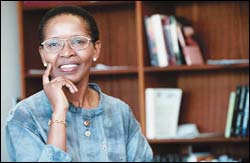Trauma is also a legacy of our democracy
03 October 2005
Prof Pumla Gobodo-Madikizela
In the final lecture of the heritage series held in the month of September, Prof Pumla Gobodo-Madikizela addressed the topic of transcending trauma. This is an extract from her talk.
Paul Lederach (philosopher and peace-building scholar) says moral imagination is the capacity to imagine ourselves in a web of relations that includes our enemies; the ability to sustain a paradoxical curiosity that embraces the complexity of venturing into uncharted territory.
I have referred to this process as rehumanisation, which is the point where the incompatible yet inextricable stories of victim, victimiser, and bystander meet. For how can a victim find language to talk about trauma, unless a perpetrator acknowledges his deeds through public accountability? And how can a bystander fully confront their role as beneficiary, and know the choices that they could have made, but didn't, unless they are witness to the testimonies of victim and perpetrator? There is an inherent risk in humanising our former enemies, those we grudge for having inflicted, or supported the infliction of trauma upon us. The exercise of moving from relationships defined by fear and divisions drawn from the past, "us and them", to those characterised by mutual respect and compassion for fellow human beings is slower and more demanding than vengeful anger and hatred. It requires work.
Yet when we step into the terrain of dialogue with those we consider our enemies, where each side will listen to the other's pain, hopes and fears, we embrace the moral imagination. We are rising above what so often comes naturally - hate - and venturing onto the path of true social and institutional transformation.
One of the fundamental starting points of the rehumanisation model of dialogue is to discard language that perpetuates the political discourse that we have inherited from the past, and create language that will define our new institutions, and contribute to meaningful social transformation.
Silence is one of the most powerful political tools. This we have always known, but it is a lesson brought home to us again through the Truth and Reconciliation Commission hearings. Through testimonies brought before the TRC, we understood just how silence, and its harmful counterpart, fear, inscribed itself in perpetrators and bystanders, and how it is now beginning to reinscribe itself in victims who should know the pain of trauma.
Therefore, silence about painful experiences that defy articulation in our institutions is the first thing that should be discarded if the goal is to create turning points in the nature and quality of our relationships as communities.
The second thing that I think should be approached with caution is language that acknowledges the past without pointing a way forward into a future where we can at last learn how to talk to one another and respect one another.
For example, in our social consciousness, or rather, in our social discourse, blackness or colouredness embodies a predefined role of victimhood. And whiteness embodies the role of perpetrator or beneficiary of apartheid privilege. Yet reality does not always correspond to these designations.
As a black woman growing under apartheid I have known extreme discrimination, racism and the trauma of exclusion. But I have also known hope and celebrated achievement. What I lost because of the exclusion suffered by my parents from many of society's economic and other benefits and privileges, and what I could have achieved had I been white, are part of my history, my past, my trauma. But does it make me a victim? Hardly.
Does continuing to define myself as a person from a "historically disadvantaged" background, and my white counter-parts as coming from "historically privileged" background help move the agenda of institutional transformation? I doubt it. Does this mean that we must therefore not talk about our difficult past and how it continues to define our relationships in subtle ways? Absolutely not.
The moral imagination challenges us to critically look at what role our collective and individual traumas play in defining the kind of institutional culture we cultivate, and what role each of us, and whatever groups we identify with, play in perpetuating the fear, suspicion, and distrust inherited from the past.
There can be no adequate reparation for the inequities and the moral horrors of our past, or for the moral betrayal that allowed these horrors to happen. I suggest, therefore, that forgiveness is a compelling and healthy response to the debt owed to those whose future was carved through the policies of exclusion.
By forgiveness I don't mean that we should forget; I mean simply an empathic recognition of the moral vulnerability of human beings, a recognition that allows victim groups to be conscious of how strong the lure of power and privilege is, and how fortunate some of us are that we did not have to face this test. I do not know how I would have behaved had I been white under apartheid.
 This work is licensed under a Creative Commons Attribution-NoDerivatives 4.0 International License.
This work is licensed under a Creative Commons Attribution-NoDerivatives 4.0 International License.
Please view the republishing articles page for more information.










